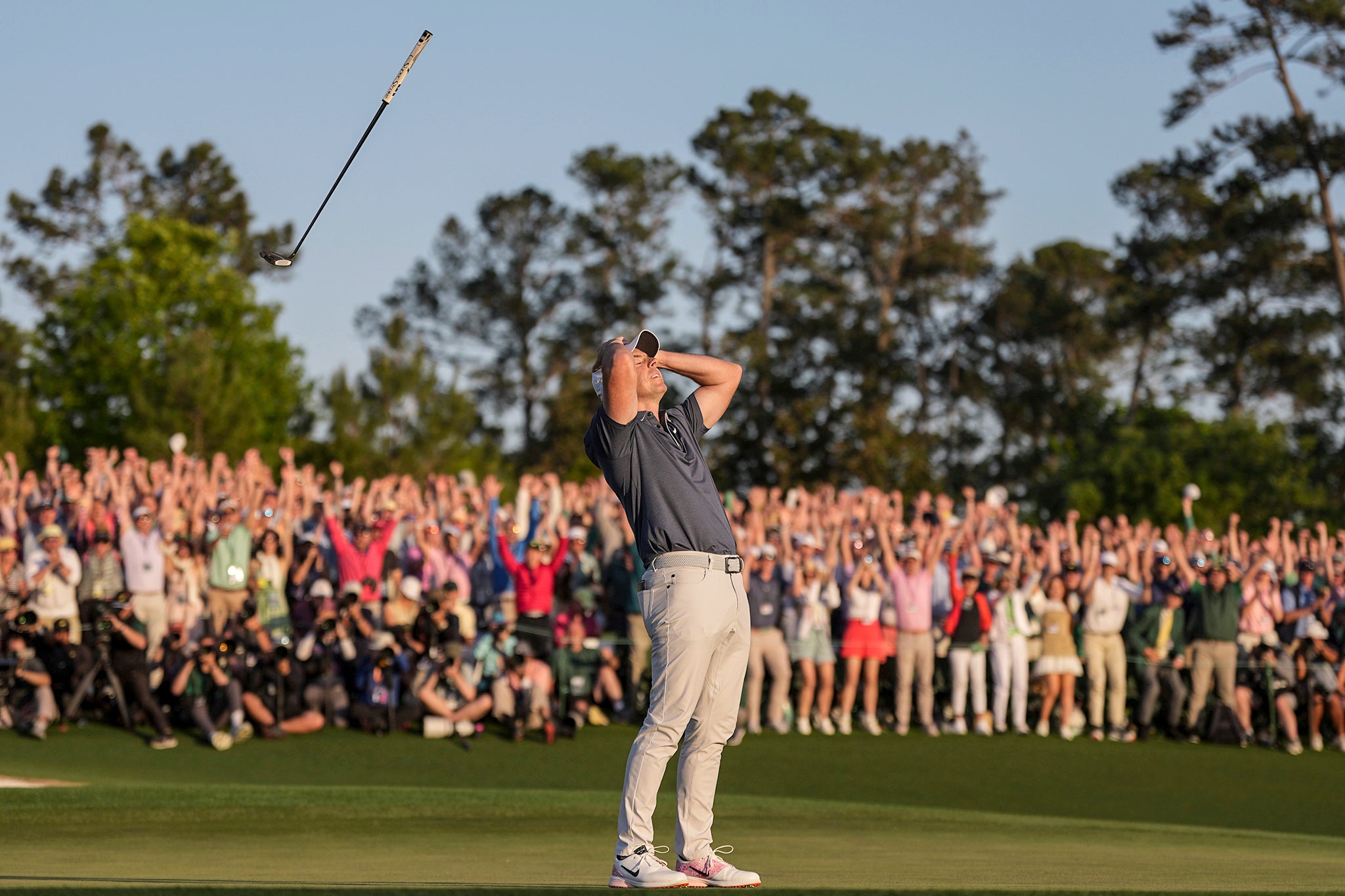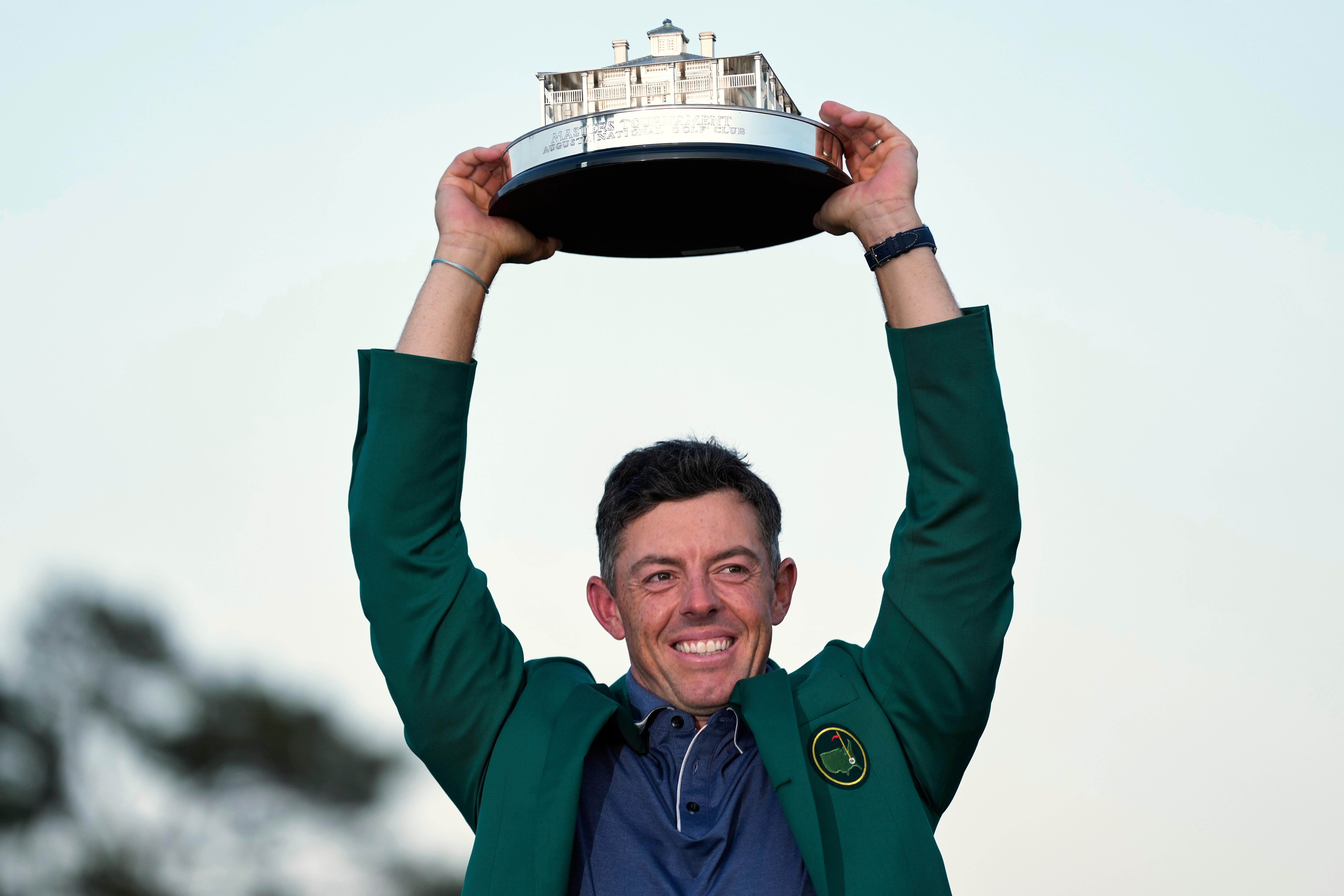Rory McIlroy has confronted his demons – he can now rack up the titles like Tiger
Almost 3,900 days since his last major title, the Northern Ireland golfer stormed his way to victory in Augusta, Georgia – and there wasn’t a dry eye in the house, writes Jim White

Sunday night was one of those moments only sport can deliver. When Rory McIlroy beat Justin Rose in a play-off for the Masters, it was the culmination of five hours of unrelenting drama, as the pair played the round of their lives across Augusta’s gruelling 18 holes. This was McIlroy, so inevitably, his prospects had rollercoastered up and down all evening.
What television it made as we watched, at times from behind the sofa, him serving up his characteristic mix of sumptuous shots and the kind of logic-defying, nerve-shredding errors that have so often undermined his genius at the last. And what made this so compelling was that, even when McIlroy’s brilliance appeared to have made him unassailable, Rose stuck clam-like to his coattails: always there, calm, dignified, gentlemanly.
Perhaps more to the point, as fortunes shifted as the two chased each other’s scores to the last, this was a contest in which nobody wanted to pick sides. What made this so unmissable was that these were not just both golfers of the highest calibre, both worthy champions, they were both the most honourable of men. There was no goodie against baddie in this narrative: both contenders more than deserved to win.
No surprise then that, in its conclusion, as a blubbing McIlroy first sank to his knees, then celebrated the end of a 3,898-day drought since his last major title by embracing Rose in a bear hug of emotion, this was a contest that provided an exemplar of sportsmanship.
Plus, in the vanquished Englishman’s generous, avuncular response, the very definition of magnanimity.
But ultimately, while it would have been wonderful to see Rose become the second oldest winner of the Masters, it was McIlroy’s victory that had the greater significance. It was McIlroy’s win that brought a smile to the face. It was McIlroy’s victory that made you appreciate the things that golf has an almost unique ability to deliver.
As he was fitted for the green jacket, he became only the sixth person, and the first European, to complete the sport’s grandest collection of titles. By adding the Masters to his past wins at the Open, the US Open and the USPGA, the Northern Irishman joins the elite. In the process, never mind Tony Jacklin, Lee Westwood, Ian Woosnam, Colin Montgomerie, Rose, or even his old mentor Nick Faldo, he has put to bed any hint of doubt that he is these islands’ finest golfer of all time.
He has achieved it all, and won the lot. And in the process up more than $100m prize money on the PGA tour alone – second only to Tiger Woods
The question now is: what does he do next? Having achieved golfing immortality, where does he go from here? Not least, having finally and comprehensively ended the most renowned drought in his sport, has the pathway now cleared for him to win yet more?

McIlroy is still only 35, in golfing terms barely middle-aged (his vanquished opponent on Sunday is nine years older). Yet he seems to have been around forever. Somehow, despite the grey flecks in his hair, the deepening worry lines in his smile and the stockier, gym-honed physique, he is largely associated in the public mind with the cherubic boy we saw on the telly 25 years ago chipping balls into the washing machine at the family home.
He was, at the time the local television station came round to record him popping the ball into the twin tub time and again, the under-10 world champion (yes, in golf they have such a thing). Such was the sublime skill he showed in his kitchen routine that it appeared this was the Northern Irish Tiger Woods.
Everyone watching him direct golf balls with such consummate control agreed it wouldn’t be long before he was placing the trophies that matter on the shelves of his ma and da’s place in Hollywood, near Belfast. That’s if he hadn’t bought them a pad in Florida by then.
And indeed, off he went, from the start winning things left, right and centre. Lifting the US Open in 2011, the PGA Championship in 2012, and the Open plus the PGA again in 2014, by the time he was just 24, he was three-quarters of the way to the grand slam and golfing immortality.
And then things started to unravel. Nerves seemed to conspire against him. Just as he looked to be adding to his major tally, he would self-destruct. So many times he got to within touching distance of adding more majors to his CV. Then, as at Augusta in 2011, St Andrews in 2021, Los Angeles in 2023 and Pinehurst in 2024, just as a lead looked unbreachable, he would shoot himself in the foot.

Before every big competition, he would be lauded as a likely favourite, though always with the accompanying caveat that he might just blow it. And invariably he did.
Not that he was bereft of victory. During his 11-year major drought, he picked up 23 lesser titles, winning millions of dollars every season. But at the big ones, however close he came, somehow he faltered.
In a sense, it was not surprising. McIlroy is not a single-minded fanatic. He might be blessed with all the skills imaginable, but he is no self-obsessive. Thoughtful, inquisitive, he is interested in the world beyond the greens.
His conversation is broad. He prefers not to talk about himself. He loves his football (he will doubtless be taking the Masters trophy to show off to the crowd at Old Trafford, a place he often goes to watch his favourite team). He is interested in politics. As he demonstrated during the breakaway of the Saudi-backed Liv project, on many subjects he is someone happy to vocalise his opinion.
Perhaps even more unusually for a dressing room full of preening macho frat boys, during the Masters, he distracted himself between rounds by reading a book (not Dickens or Hardy perhaps, but The Reckoning by John Grisham). Certainly opening up a novel is not something you expect his big rival Bryson DeChambeau to be doing. He’s more likely to pass the time crushing beer cans into the forehead of a Maga-happy bro.

But McIlroy sees the outside world. Which, paradoxically, suggests he is more aware of the meaning of his sport and its history. He understands its nuances in a way some of his less curious rivals don’t. It means that while his skills are sufficient for him to cruise a lesser tournament, at the big ones his mind is constantly churning over its significance. You could see his mental turmoil when he stumbled on Sunday. The look in his eye was clear: he thought he was going to blow it yet again. He looked terrified. This is not a man with a face for poker.
And for over a decade, no matter the changes to his swing, or the therapy sessions, or the counselling, at the big tournaments his brain was too full of the consequences of failure to allow his brilliance to triumph. He said the arrival of his children changed his outlook on life. And the footage of him cheering on in delight as Poppy, his four-year-old daughter, insouciantly putted a challenging 20-yarder during a practice round at Augusta was a delight. But then his children were around last year, and they didn’t alter his perspective when he blew the US Open at the last.
What this victory at Augusta may finally have done is allay his fears and put his worries to rest. Now he has done it, it proved he is not doomed never to reach the ultimate. With the demon that has torched his efforts for the past 11 years off his back, now he might be able to relax and enjoy himself at the big ones as he does at the lesser competitions. Maybe he will now feel sufficiently unburdened to chase after Woods and Jack Nicklaus and establish himself near the top of the all-time Major-winners list, a place his skills have long suggested he belongs. Maybe he will now reach the very historical summit of his sport.
But then this is Rory McIlroy, the most singular of sporting talents. So it might be unwise to bet on it.





Join our commenting forum
Join thought-provoking conversations, follow other Independent readers and see their replies
Comments